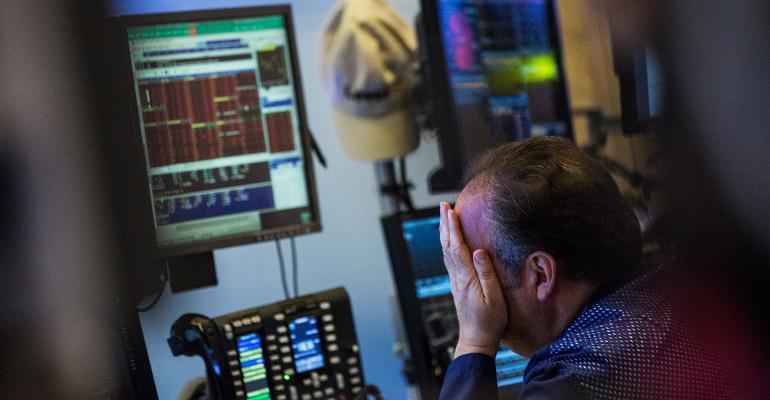(Bloomberg Opinion) -- There is a genre of investment research that continuously predicts economic disaster that I call “macro doom.” It has become very popular. It seems that everyone is an expert in macroeconomics today, and they’re all predicting a bust of some kind.
There’s always something for this cohort to worry about, and these days it’s mainly about inflation and how prices of commodities will go to infinity due to shortages in just about every tradable raw material. Oil is a particular focus, with the macro doomers predicting a baseline of $200 a barrel for West Texas Intermediate crude or even much higher. Some are now starting to focus on agriculture, and there is open discussion on Twitter about an impending famine — in the U.S.!
Being somewhat of an inflationista myself, I’m sympathetic to these views. For example, I would agree that the bull case for agricultural commodities is strong based on rising fertilizer prices, which will incentivize farmers to use less fertilizer, resulting in lower crop yields. But some predictions are so extreme as to veer into utter ridiculousness. It would take a lot of things going wrong at exactly the same time to have a famine in the U.S. I would characterize this as hyperbole.
It’s not all about hyperinflation, though. There is a subgenre of macro doom that focuses on the rising dollar, which will lead to deflation and falling bond yields. This dollar-bull-deflation-doom thesis has many adherents. I don’t understand the thesis and I don’t care to. You’d think that inflation going from 2% to 8% in a year would discredit these people, but they are louder than ever.
Many people think that the economy is accident-prone, and that shocks happen every so often and risk plunging the economy into a deep recession. The Covid-19 pandemic is an example. But people learned the wrong lessons from the pandemic, which is that the economy is not accident-prone, but rather accident-resistant. For all that has happened, there have only been four major bear markets in the last 100 years. We know perfectly well why the market crashes, but we have no idea why it doesn’t.
Doom sells newsletters, though, which is probably why I’m not selling many newsletters these days. I’m the one saying that everything’s going to be just fine. To be honest, bearish arguments are always more compelling than bullish ones because they sound smarter. They’re often seductive to novice investors. Plus, it’s simply harder to implement bearish strategies. I had lunch with a newbie investor in my town of Myrtle Beach, South Carolina, in 2012 who was convinced the stock market was going to crash. I quickly identified the source of his information, and suggested he lay off the doom porn. He took offense, and I haven’t spoken to him since. The S&P 500 Index is up 250% since the end of 2011.
It’s unproductive to be monotonically bearish and thinking bad things are going to happen all the time. But it is good to be skeptical -- and there is a difference. For example, I thought that good questions were being asked about the adverse effects of index investing a few years ago, and I was one of the people asking those questions. I pointed out that flows into index funds concentrated ownership into a handful of mega-cap stocks, leading to a phenomenon where big stocks get even bigger and dominate the returns of the index, making it even harder for active managers to outperform — which is exactly what played out.
There were lots of skeptics of Cathie Wood’s investment strategy of buying the most expensive technology companies with promising technologies, and they were handsomely rewarded if they got the timing of the trade right. Inherent in a skeptical argument is the knowledge that there is an imbalance or distortion, but it is probably going to continue because markets always correct. Being skeptical, rather than bearish, keeps you out of trouble.
To be sure, being monotonically bullish is slightly less dumb. Stocks go up over time with increasing earnings and economic growth, as everyone knows. But there is no rule that stocks must go up. There was one period in history, from 1929 to 1946, when they went down for 17 years. That’s a long time to ask an investor to dollar cost average their basis lower. Though with the knowledge that stocks usually do rise over time, it makes sense to be positioned for future gains along with a healthy dose of skepticism to help manage your risk.
The macro doom crowd is made up of very smart people, and they’re definitely fun to hang out with. Plus, it’s good to have a diversity of opinions that challenges established narratives. It’s no secret that the great trades usually start with some crazy person tweeting into the void, like Michael Burry of “The Big Short” fame. Maybe the macro doom crowd will be proven right this time. It sure doesn’t seem like the current high inflation rates will be coming down anytime soon without drastic action by the Federal Reserve, which it seems hesitant to do. Who am I kidding? Everything is going to be OK. Maybe.
More From Writers at Bloomberg Opinion:
The Fed Has Made a U.S. Recession Inevitable: Bill Dudley
Why the Fed's Shrinking Balance Sheet Matters: Mohamed El-Erian
What You’re Expecting From Earnings Won’t Happen: John Authers
To contact the author of this story:
Jared Dillian at [email protected]





